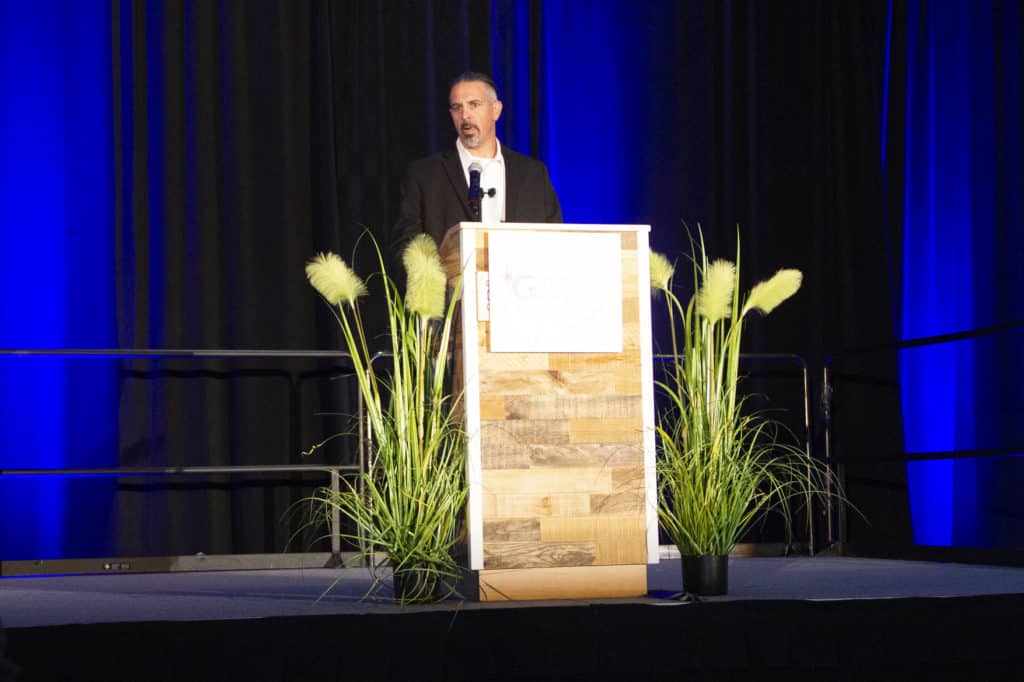
[Image above] Ronald J. Holmes, director of packaging and technology at Diageo, discusses challenges the company faces as it transitions to using more recycled glass in production. Credit: ACerS
In a time of supply chain delays and growing inflation, R&D investments often experience reductions as manufacturers look to manage risk. In certain areas, however, the cost of not innovating is an even bigger risk, leading manufacturers to pursue novel solutions even in the face of constrained budgets.
Sustainability of operations, such as decarbonization and energy efficiency, is one area in which future benefits can far outweigh short-term costs. Confidence in this idea was on full display during the 83rd Conference on Glass Problems (GPC), which took place last week in Columbus, Ohio, from October 31–November 3.
GPC is the largest glass manufacturing conference in North America. It is coorganized by The Glass Manufacturing Industry Council (GMIC) in partnership with Alfred University. The annual conference aims to provide a platform for leading experts and manufacturers to share information on new innovations and methods to deal with challenges the industry faces with manufacturing glass.
This year, 426 attendees converged on the Greater Columbus Convention Center to participate in the conference, which featured numerous talks on various aspects of sustainability. Student attendance was funded in part by a $15,000 donation from the Air Products Foundation given to GMIC and the Ceramic and Glass Industry Foundation (CGIF) to foster innovation by the next generation of ceramic and glass professionals.
The move away from fossil fuels toward alternative energy sources was a main focus of sustainability initiatives presented at the conference. Numerous speakers described their experiences with electrifying glass furnaces, including the potential impact of electrification on refractories. Hydrogen fuel was also discussed frequently. For example, Andrew Keeley of NSG Pilkington presented results from a trial the company conducted in 2021 to demonstrate their float glass furnace could run safely at full production using hydrogen fuel without impacting product quality.
Materials used in glass manufacturing also received a fair amount of attention. Ronald J. Holmes of Diageo discussed challenges the company faces as it transitions to using more recycled glass in production, such as deviations in product color. Also, Alyson Myers of Calcean described the benefits of using oolitic aragonite sand rather than mined calcium carbonate in glass manufacturing.
Speakers also highlighted several collaborations that focus in part on advancing glass manufacturing sustainability. For example, Oscar Verheijen of CelSian and Bruno Purnode of Owens Corning copresented on the GlassTrend consortium while John J. Simmins of Alfred University talked about the university’s new Center for Glass Innovation.

“The continued improvements that GMIC and the GPC Advisory Board have instituted into the annual Conference on Glass Problems was evident in the excellence of the 83rd Conference on Glass Problems. The mix of high-level talks, many from manufacturing companies, along with lectures on emerging technologies, like hydrogen fuel and all-electric and hybrid furnace designs, is the right recipe for a conference that provides substantial value to the glass manufacturing industry,” says GMIC executive director Bob Lipetz.
This GPC was Lipetz’s last as executive director, as he is retiring at the end of this year. Kerry Ward will become the new executive director beginning January 2023.
In acknowledgement of his retirement, Lipetz presented a “love letter” to U.S. glass manufacturing as the opening plenary on Tuesday morning. The talk covered historical advances in glass manufacturing up to current projects resulting from the United Nation’s Sustainable Development Goals.
“My 12-year tenure with the Glass Manufacturing Industry Council has been an extraordinary journey professionally and personally. It has been gratifying to see GMIC grow into the full potential of its mission as the coordinator of glass manufacturing industry technical information and initiatives. Along the way, I have made many friends. It is remarkable how much glass got under my skin,” he says.

The 84th Conference on Glass Problems will take place Oct. 30–Nov. 2, 2023, in Columbus, Ohio. Abstract submissions are open until Jan. 23, 2023, at 9 p.m. Eastern.
View more photos from GPC 2022 on ACerS Flickr page.
